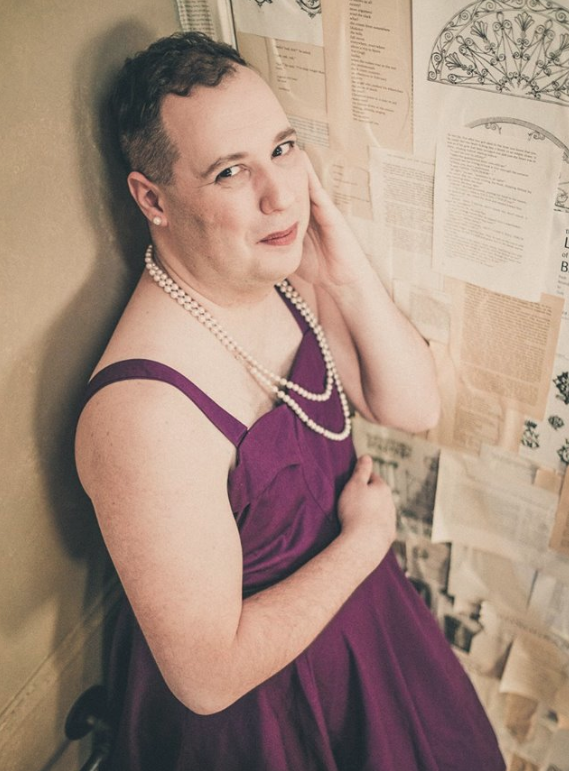Brian Liberge

- Role: Game Designer
- Company: Beer Star Games
- Location: Boston, Massachusetts, USA, Earth
QRM had a chat with Brian Liberge!
QRM: Can you tell us a little bit about who you are and what you do in the games industry?
Brian: I'm a tall, white, genderqueer game designer in tabletop RPGs. So I write all them words, test mechanics and sometime act as producer and publisher.
QRM: How long have you been involved in the game industry, and what projects have you worked on? What are you working on currently?
Brian: According to my linkedin I started in 2010. I'm sure I put a lot of thought into that date at one point and its very accurate. I've been published by Kobold Press, Raging Swan and Gygax Magazine, for games like Dungeon World, Pathfinder and D&D. I'm probably best known for my work on Kobold Press' Midgard World for D&D 4th edition. I've done some self publishing as well, including Pulp! the RPG and B.E.A.R.D.! the Card Game.
I'm currently working on a very cool game called Ace Adventure, about punk pilots fighting social injustice and giant monsters in the late 1920s.
QRM: What inspired you to get started in the games industry?
Brian: I was running a campaign using D&D 3.5 when 4th edition came out. I wanted to switch systems but not lose all my work on my home-brewed world. So I started rebuilding material for the new edition and blogging about it so others could benefit. Eventually Chris Stevens from StufferShack.com reached out to me and offered me money for my work.
QRM: In what ways do you feel your experiences as a queer person manifest in the games you work on, and influence the work you do?
Brian: I feel really pushed to be inclusive as possible. Not just for queer representation but everyone else. The default white male protagonist is dangerous and boring. We need to be able to see ourselves in the games we play, not just as one token character but regularly and in at all levels.
QRM: Do you have a favourite queer character—in games or media more generally? If so, what is it about them that makes them your favourite?
Question asked by @kamienw.
Brian: Right now I'm very into Utena and Steven Universe. My head canon is Utena is a non-binary bisexual who just doesn't have the words or the will to use the words. They just want to be themselves without having to label themselves. Then there's the world of Steven Universe, especially Stevonnie and Garnet. There have been so many little moments, like Stevonnie trimming their stubble with a sword that have just spoken to me. Like there it is and there I am. I want Garnet's wedding attire soooooo much.
QRM: Have you ever encountered roadblocks in trying to include queer characters in games? What do you think is preventing greater diversity within games?
Question asked by @dustinalex91.
Brian: Luckily for me, the only roadblock I've had is myself. I sometimes slow down trying to include characters who are queer, but who aren't defined by their queerness. When you have only two lines to nail down an NPC I can start getting really nitpicky with myself.
QRM: Why do you think it is important that queer audiences are able to see themselves represented in the games they play, and in the developers who make the games they see? What can we do to improve the industry for queer audiences and devs?
Brian: If you can't see yourself in a community it's very hard to see yourself as part of that community. Especially in the industry itself. It can be grueling. If you don't see someone in a more advanced position than the one your in, when things get tough, it's easy to think that there's no long term possibilities for you anyway.
QRM: Have you ever mentored somebody in your role in games, or been mentored? If so, what made these experiences worthwhile for you?
Question asked by @pepelanova.
Brian: In tabletop games, there's so few people who can make it their full time jobs. I feel like that creates less opportunities for extended mentoring, but there are still many opportunities for mentoring moments. I've been blessed to have received a lot of memorable advice from folks like Wolfgang Baur, Cam Banks & Glenn Given. I hope I've been able to help other people as well.
QRM: In what ways can non-queer folk increase and support queer diversity present within games, as well as in the industry more broadly? How can we all work to support intersectional approaches to diversity, and why is this important?
Brian: Every model in your game needs to be able to wear skirts. If that sounds like a lot of work don't make skirts.
It's really easy to create a field where people can enter pronouns and have them hot swapped into your dialogue.
Everytime you make an NPC take another look. Did you start with them as a white guy? Why is your world 95% white guys? Question yourself constantly and do better.
QRM: Is there a message that you would like to share with the queer game players, game studies researchers, and other interested folks who comprise the Queerly Represent Me community?
Brian: Every time you let two queer characters kiss a young person discovers who they truly are.
*
You can find Brian on Twitter.
You can also check out their work here!
